
Background information
The self-sufficient man who lost himself
by Darina Schweizer
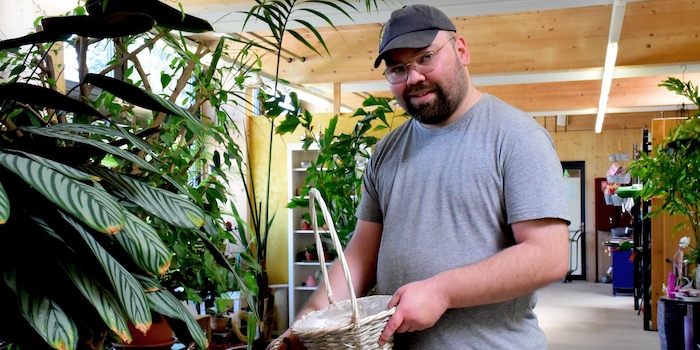
Secondhand stores have long ceased to be a mere hodgepodge of dust catchers. Instead, many have specialised. These days, you’ll even find thrift shops for plants and garden products. A very special one’s hidden away in the municipality of Embrach in Canton Zurich.
Out of sight. That’s where people with mental health disorders were often housed in the past. Such as in the former Hard Psychiatric Centre. Located on the outskirts of Embrach in the canton of Zurich, it’s hidden away behind an earth wall. Few people know about the green treasure trove that’s hidden behind it: a secondhand store for plants and garden supplies. It goes by the name of «Gartenbrockenhaus» and is run by VESO, the leading institute for social psychiatry in the region of Winterthur (website in German).
«I often wish we were more visible,» says Christian Dütschler, the trained head gardener and job counsellor in charge of horticulture as well as the thrift shop. 18 people with mental health conditions work here. The rules are clear: you’re not allowed to show up with acute drug problems, for example. And there are probationary periods and notice periods, just like on the primary labour market. And yet, things are different.
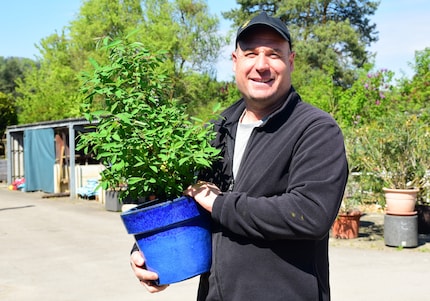
There’s lots of clanking and scraping. In the goods receiving area, a woman wearing a colourful hairband is stacking plant pots. «Most of them only have slight marks caused by the weather or general wear and tear,» Karin explains. She’s been working at the «Gartenbrocki» for 15 years. In true pro fashion, she can tell which pot will fit which saucer just by looking at it.
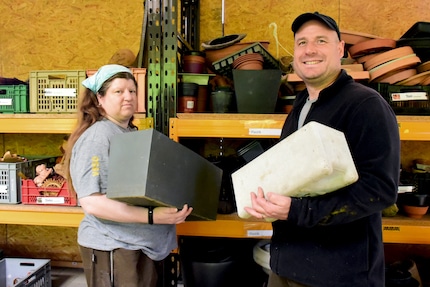
Behind her, a short-haired woman is repotting a succulent. Christian Dütschler seems surprised as he points to a small plant in front of her and says: «That one already has a price?» «Yes, I’ve already labelled it,» she replies. So far, I don’t get the impression that things are any different here than in a regular secondhand shop. At most, some faces seem a little more serious, but also more genuine. I can only guess, but I reckon these people have had their fair share of struggles.
Christian Dütschler leads me past garden lighting, tables, tools and lawnmowers. The thrift shop annually sells around 20,000 used garden items as well as indoor and outdoor plants. Around 90 per cent are donated. They stem either from private donors, house clearances or discarded indoor greenery. The store also buys some seasonal plants, fertiliser and soil.
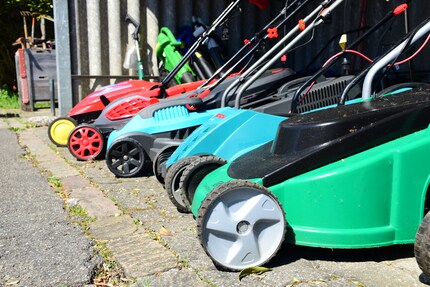
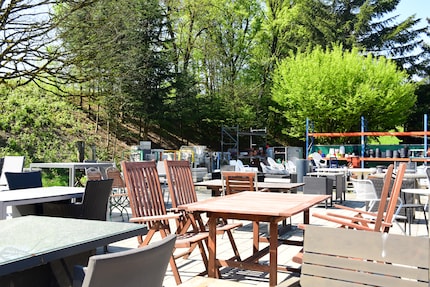
We stop in front of a pair of practically identical pots. One has a one-franc, the other a five-franc price tag. Price differences aren’t always easy to grasp, says Christian Dütschler. «Our employees set the prices. We only check and correct them if necessary. This helps our staff members trust their own judgment. Ultimately, how much a product is worth depends on who you ask. Each person will have a different opinion. That’s why we appreciate it if baffled customers approach us.»
But not everyone does. At least not personally. Christian Dütschler tells me about a customer who recently wrote a bad review on Google because he thought a price was too steep. «It’s a pity he didn’t ask our employees at the time. They would’ve explained why this was the case.» I shake my head. Judging seems to be easier than reaching out. This is also the case when it comes to mental illness.
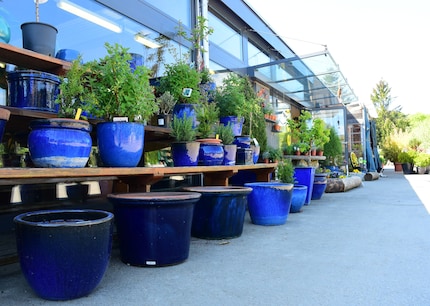
A customer rings the bell at the till. He’s the third person to do so in the last ten minutes. It’s high season at the secondhand garden store. Garden furniture, large pots and outdoor plants including agaves are proving particularly popular. Christian Dütschler looks around, but there’s no one to be seen. He calls out into the warehouse. «I’m coming, I’m coming, I heard it,» a tiny voice replies. A petite young woman appears and gets behind the till. The customer doesn’t seem bothered about the wait. He gives her a smile. The young woman gives him a shy smile back.
«For many of the employees here, it’s not easy to show up every day. Especially if it’s a bad one. It costs them a lot to pull themselves together,» Christian Dütschler adds. Getting out of the house is usually the hardest step. Once that’s done, there are familiar faces, a routine and flowering plants waiting at the «Gartenbrocki». Manual work with soil has been proven to strengthen mental health (https://ackerhelden.de/blogs/bio-garten-blog/gartnern-und-mentale-gesundheit-was-sagt-die-wissenschaft#:~:text=Eine%20Meta%2DAnalyse%20von%2022,und%20Angstzust%C3%A4nden%20hilfreich%20sein%20kann.&text=Gardening%20can%20also%20contribute%2C%20to%20improving%20cognitive%20skills%20F%C3%A4h.) (page in German). And Christian Dütschler confirms this. «When our employees spend time outdoors, they can connect with themselves and their bodies. It’s a grounding experience.»
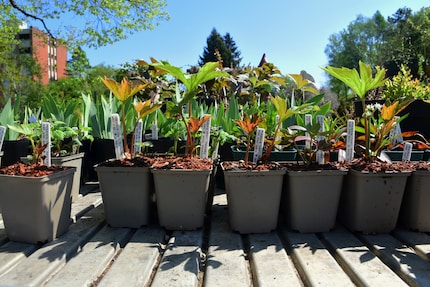
Behind us, a young man called Dennis is lovingly tending to a palm tree. He carefully examines the leaves, cuts off a few of them and waters it. «Many of our employees have a keen instinct. They immediately pick up on how people and plants are doing,» Christian Dütschler tells me. And I believe him. No doubt the palm tree will thrive with Dennis looking after it.
The dedication of the employees bears fruit time and again. Whenever a new plant sprouts or blossoms, that’s a magic moment, says Christian Dütschler. «It’s proof of what our staff members are capable of creating. And when a customer buys the plant, this conveys a feeling of the work being appreciated. It also helps them feel part of society.»
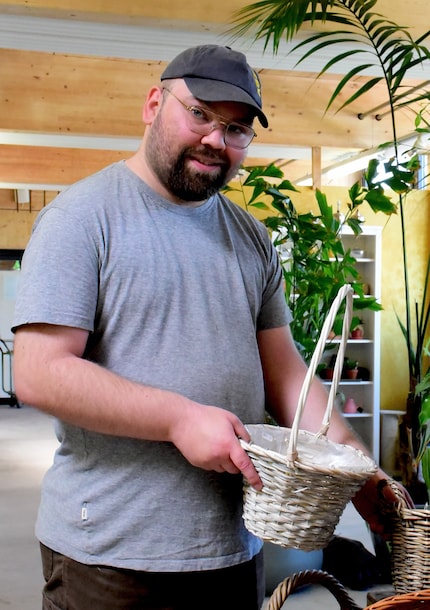
Nevertheless, it’s a rocky road back into the primary labour market. Back in the day, employers often created jobs for people with mental disabilities, says Christian Dütschler. «Many of these positions have been cut.» Instead, many individuals are now employed in the secondary labour market. This is important, says the store manager, but adds: «The pressure is a lot less than in the primary labour market. Anyone wanting to return to it will struggle to put up with it.»
That’s why Christian Dütschler thinks it makes sense to prepare people for the secondary labour market before gradually reintegrating them into the primary labour market. To this end, VESO offers integration jobs at partner companies. «It’s like our plants at the «Gartenbrocki»,» he says. «You can see the difficulties they’ve been through. But in the right environment, they blossom and become visible again.»
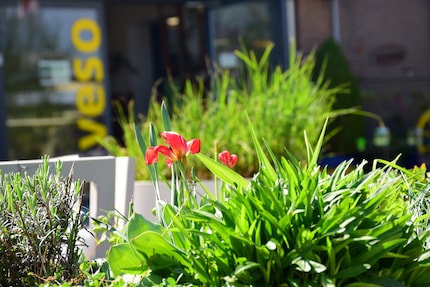
To protect the privacy of the employees, I’ve only used their first names or anonymised them.
I love everything with four legs or roots – especially my rescue cats Jasper and Joy and my collection of succulents. I’m happiest following the scent of stories about police dogs and cat groomers – or cultivating thoughtful tales in garden flea markets and Japanese gardens.
Interesting facts about products, behind-the-scenes looks at manufacturers and deep-dives on interesting people.
Show all